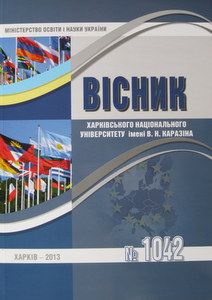Intellectualization of the economy: evolution in the context of global development
Abstract
The article presents methodological principles of the economy intellectualization within the global development.
On the basis of the generally accepted methodological guidelines and the historical experience the author proves that the process of the economy intellectualization within the of global development includes a wide variety of relationships, where genetic relations, determining a spatio-temporal order of its formation plays an important role. The vector of intellectualization is parallel to the vector of technological transformation. The main features of the economy intellectualization are change of the industrial type of economy, based on the knowledge and information, transformation of the nature and forms of labor, and formation of a new system of cultural values in terms of global development.
The author concludes that conditions of the mankind existence at the beginning of the XXI century testify about transition to a new strategy of global development, so calles up-to-date intellectual economy, based on the widespread use of information and knowledge as strategic resources for the global economy development. This feature orientating the development of relations among economic subjects caused by the current world economy functioning; necessitates a quantitative and qualitative compliance in the development of elements of the world productive forces as well as the adequacy of their economic forms. It also expresses the integrity and orientation of the global economy in terms of its global development.
Downloads
References
Грішнова О. А. Інтелектуалізація праці – визначальна ознака постіндустріального суспільства / О. А. Грішнова // Теоретичні і практичні аспекти економіки та інтелектуальної власності : зб. наук. праць Приазов. держ. техн. ун-ту. – Маріуполь, 2009. – С. 147–150.
Гук Н. А. Посилення інтелектуалізації праці та тенденції її структурних зрушень в Україні / Н. А. Гук // Актуальні проблеми економіки. – 2011. – № 2. – С. 125–130.
Другов О. О. Інтелектуалізація – як шлях до підвищення конкурентоспроможності реального сектора економіки України / О. О. Другов // Фінансово-кредитна діяльність : проблеми теорії та практики : зб. наук. пр. – 2009. – Вип. 2 (7). – С. 206–211.
Иноземцев В. Л. За пределами экономического общества. Постиндустриальные теории и постэкономические тенденции в современном мире / В. Л. Иноземцев. – М. : Academia, 1998. – 640 с.
Іщук С. О. Інтелектуалізація як світова тенденція економічного розвитку / С. О. Іщук // Вісник Університету банківської справи Національного банку України. – 2011. – Вип. 2. – С. 91–95.
Кендюхов О. В. Ефективне управління інтелектуальним капіталом : монографія / О. В. Кендюхов; НАН України. Інститут економіки промисловості. – Донецьк : ДонУЕП, 2008. – 359 с.
Куценко В. Економіка знань потребує умілих рук / В. Куценко // Дзеркало тижня. – 2006. – № 34 (613). – С. 8–9.
Сакайя Т. Стоимость, создаваемая знаниями, или история будущего / Т. Сакайя // Новая индустриальная волна на Западе: антология / под ред. В. Л. Иноземцева. – М. : Academia, 1999. – С. 337–371.
Сардак С. Е. Інтелектуалізація міжнародного руху людських ресурсів як провідний засіб вирішення глобальних проблем і викликів економічного розвитку / С. Е. Сардак // Вісник Криворізького економічного інституту КНЕУ. – 2010. – № 4. – С. 6–11.
Семиноженко В. Економіка знань: потрібна гра на своєму полі / В. Семиноженко [Електронний ресурс]. – Режим доступу : http://www.day.kiev.ua/uk/article/podrobici/ekonomikaznan-potribna-gra-na-svoiemu-poli.
Сем’янчук П. М. Проблеми інтелектуалізації праці в Україні та шляхи їх вирішення / П. М. Сем’янчук // Науковий вісник НЛТУ України. – 2008. – Вип. 18(4). – С. 215–225.
Стюарт Т. Интеллектуальный капитал. Новый источник богатства организаций [Электронный ресурс]. – Режим доступа : http://www.gumer.info/ bibliotek_Buks/ Econom/stuart/01.php.
Тоффлер Э. Третья волна / Э. Тоффлер. – М. : АСТ, 2010. – 784 с.
Україна у вимірі економіки знань / за ред. акад. НАН України В. М. Гейця. – К. : Основа, 2006. – 592 с.
Arrow K. J. The Economic Implications of Learning by Doing / K. J. Arrow // Rev. Econ. Stud. – 1962. – V. 29, N 3. – P. 155–173.
Human Development Report [Electronic resource]. – Mode of access : http://hdr.undp.org/en.
OECD Strategic Response to the Financial and Economic Crisis. Contributions to the global effort [Electronic resource]. – Mode of access : http://www.oecd.org/dataoecd/33/57/42061463.pdf.
Post-Scarcity Prophet. Economist Paul Romer on growth, technological change, and anunlimited human future. Interviewed by Ronald Bailey [Electronic resource]. – Mode of access : http://www.reason.com/0112/ fe.rb.post.shtml.
Authors who publish with this journal agree to the following terms:
- Authors retain copyright and grant the journal right of first publication of this work under the terms of a license Creative Commons Attribution License 4.0 International (CC BY 4.0).
- Authors are able to enter into separate, additional contractual arrangements for the non-exclusive distribution of the journal's published version of the work (e.g., post it to an institutional repository or publish it in a book), with an acknowledgement of its initial publication in this journal.
- Authors are permitted and encouraged to post their work online (e.g., in institutional repositories or on their website) prior to and during the submission process, as it can lead to productive exchanges, as well as earlier and greater citation of published work.




